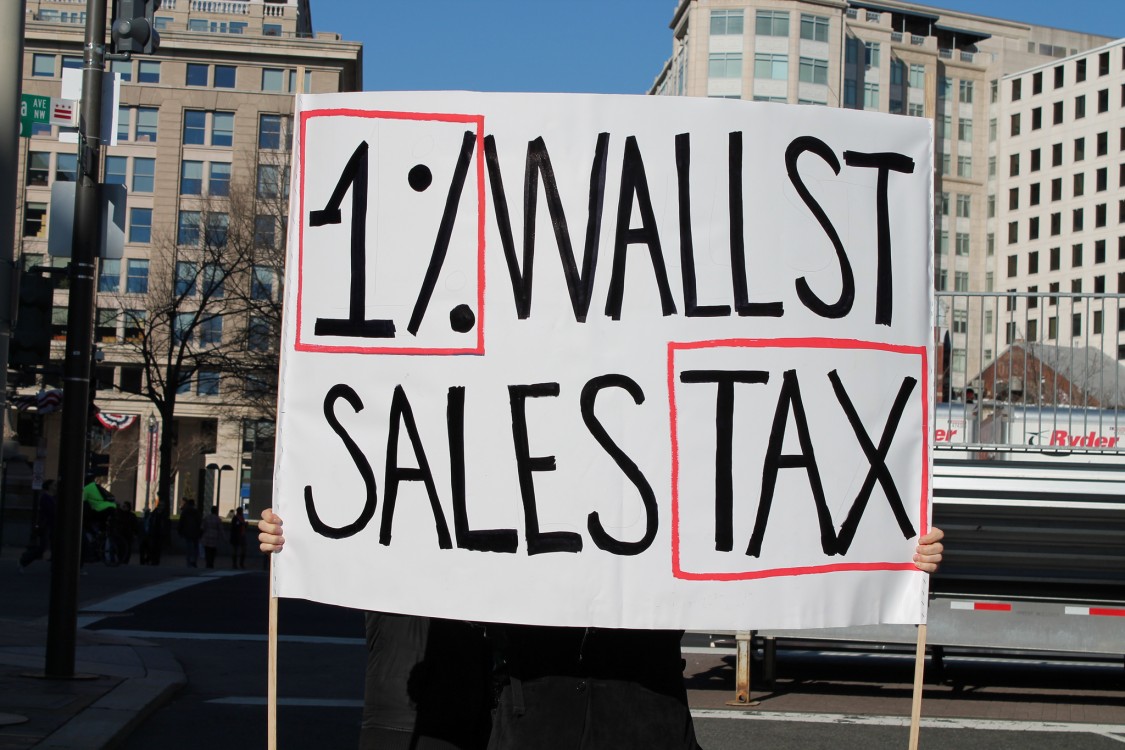
Why is there so little discussion about one of Bernie Sanders’s most important proposals – to tax financial speculation?
Buying and selling stocks and bonds in order to beat others who are buying and selling stocks and bonds is a giant zero-sum game that wastes countless resources, uses up the talents of some of the nation’s best and brightest, and subjects financial market to unnecessary risk.
High-speed traders who employ advanced technologies in order to get information a millisecond before other traders get it don’t make financial markets more efficient. They make them more vulnerable to debacles like the “Flash Crash” of May 2010.
Wall Street Insiders who trade on confidential information unavailable to small investors don’t improve the productivity of financial markets. They just rig the game for themselves.
Bankers who trade in ever more complex derivatives – making bets on bets – don’t add real value. They only make the system more vulnerable to big losses, as occurred in the financial crisis of 2008.
All of which makes Bernie Sanders’s proposal for a speculation tax right on the mark.
He wants to tax stock trades at a rate of 0.5 percent (a trade of $1,000 would cost of $5), and bond trades at 0.1 percent.
The tax would reduce incentives for high-speed trading, insider deal-making, and short-term financial betting. (Hillary Clinton also favors a financial transactions tax but only on high-speed trading.)
Another big plus: Given the gargantuan size of the financial market and the huge volume of trading occurring within it every day, this tiny tax would generate lots of revenue.
Even a 0.01 percent transaction tax (a basis point is one-hundredth of a percentage point, or 0.01 percent) would raise $185 billion over 10 years, according to the nonpartisan Tax Policy Center.
Sanders’s 0.5 percent tax could thereby finance public investments that enlarge the economic pie rather than merely rearrange its slices – like tuition-free public education.
After all, Americans pay sales taxes on all sorts of goods and services yet Wall Street traders pay no sales taxes on the stocks and bonds they buy.
Which helps explains why the financial industry generates about 30 percent of America’s corporate profits but pays only about 18 percent of corporate taxes.
Naysayers led by the financial industry’s lobbyists (the Financial Services Roundtable and Financial Markets Association) warn that even a small tax on financial transactions would drive trading overseas, since financial trades can easily be done anywhere.
Baloney. The U.K. has had a tax on stock trades for decades yet remains one of the world’s financial powerhouses. Incidentally, that tax raises about 3 billion pounds yearly (the equivalent of $30 billion in an economy the size of the U.S.), which is pure gravy for Britain’s budget.
At least 28 other countries also have such a tax, and the European Union is well on the way to implementing one.
Industry lobbyists also claim the costs of the tax will burden small investors such as retirees, business owners, and average savers.
Wrong again. The tax wouldn’t be a burden if it reduces the volume and frequency of trading – which is the whole point.
In fact, the tax is highly progressive. The Tax Policy Center estimates that 75 percent of it would be paid by the richest fifth of taxpayers, and 40 percent by the top 1 percent.
It’s hardly a radical idea.
Between 1914 and 1966, the United States itself taxed financial transactions. During the Great Depression, John Maynard Keynes urged wider use of such a tax to reduce excessive speculation by financial traders. After the Wall Street crash of October 1987, even the first President George Bush endorsed the idea.
Americans are fed up with Wall Street’s financial games. Excessive speculation contributed to the near meltdown of 2008 – which cost millions of people their jobs, savings, and homes.
So why is it only Bernie Sanders who’s calling for a financial transactions tax? Why aren’t politicians of all stripes supporting it? And why isn’t it a major issue in the 2016 election?
Because a financial transactions tax directly threatens a major source of Wall Street’s revenue. And, if you hadn’t noticed, the Street uses a portion of its vast revenues to gain political clout.
So even though it’s an excellent idea championed by a major candidate, a financial transactions tax isn’t being discussed this election year because Wall Street won’t abide it.
Which maybe one of the best reasons for enacting it.
3 WAYS TO SHOW YOUR SUPPORT
- Log in to post comments

















Comments
Jack replied on
Trans tax
Let Wall Street that benefits from our multiple wars, pay for them